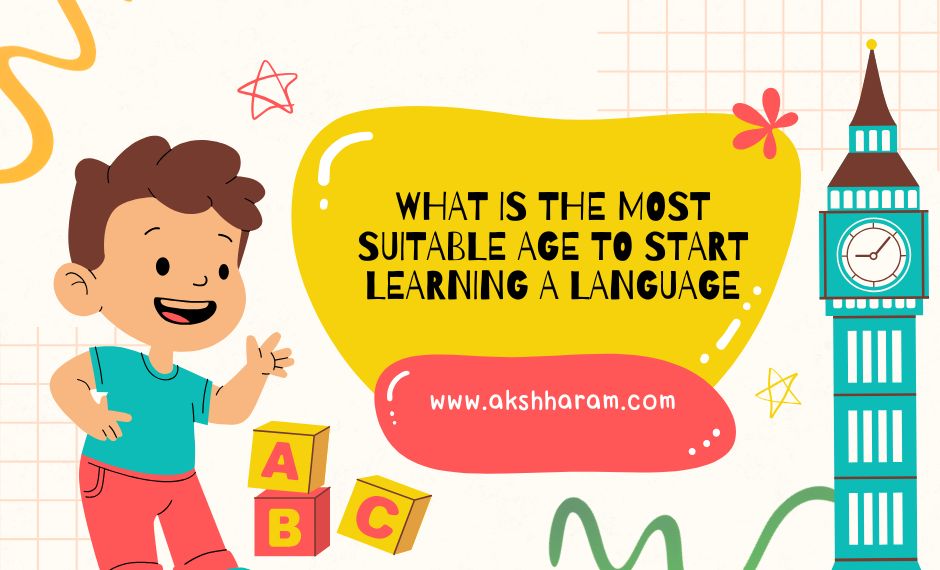What is the most suitable age to start learning a language

Do you wish that your children become adept in handling multiple languages? Do you hope that your kids become well-versed with the ideas and perspectives of a new language? Do you dream of your children switching between different languages with ease?
You must be wondering what exactly is the most suitable age to start learning a new language. We all know that children learn faster than adults. However, studies have revealed that there is a particular time, when it gets more challenging.
It takes time, skill, and determination to learn a new language and the level of ease may also vary for different people. Children learn so fast that they can achieve native-speaker levels with ease.
How we learn
Language learning is an important function of the brain, through which you can make sense of the world around you. Exposure to language, therefore is very essential.
Babies are able to speak in their mother tongue, as they are hard-wired to listen to and mimic languages even before birth. And this ability to express themselves progresses at an amazingly rapid rate in the first years of life.
Children acquire language skills through an implicit learning process, which involves absorbing and mimicking what they listen to.
A Structured Approach
Schools help us to figure out the ways to learn. Some of us learn best by listening while others by writing down and memorizing rules and formulas.
This more structured approach comes handy while learning a new language, more so because languages are basically very structured by nature.
Attention spans are also important. Children lack this focus and attention span that comes with more structure.
Why start at a young age?
Studies have confirmed that, if children learn a new language at a younger age, their creativity, critical thinking skills, and flexibility of mind improve markedly. The foundations for attitude, thinking, and learning are laid down during the first three years of life.
The use of this natural ability should be encouraged. According to studies, 50% of learning ability is developed by age 4 and another 80% by age 8. However, this does not imply that an 8 year old child is armed with knowledge and intelligence. This just means that the main learning pathways are acquired during the first few years.
A young learner can adopt pronounciations better, recreate new sounds, and learn through play. Storage of facts and information occurs as we grow older.
Best Age to learn a new Language
A study done by MIT in the US indicates that there is a critical period, after which learning a new skill, becomes difficult.
The findings of the study were that the best time to learn a new language and become proficient like a native speaker, is by the age of 10. It is easier for children below the age of 10 to absorb new information and prove their mettle in a new language.
It's better to learn a new language before 18
Youngsters under the age of 18 have a tremendous ability to master the grammar of a new language, but beyond this point, it gets really tough.
This means that childhood is the best time to learn the grammar of a new language, but the proficiency continues way up to the teenage years as well. After the age of 18, quick learning is possible, but attaining the proficiency of a native speaker is not.
Why there is decline in language learning ability after 18
The three factors that are responsible for the decline in language learning ability after the age of 18 are:
Social changes : At 18, kids pass out of high school, move on to college, or start building their careers. Under these circumstances, they lack the time, opportunity or learning environment to learn a new language with the same zeal as they did, when they were younger.
Interference from one's own primary language: The second possibility is that, after one becomes proficient in the first language, it's rules cause a hindrance in the learning of a new language.
Continuing brain development: Lastly, learning becomes harder due to the changes in the brain that continue during the late teens and early twenties.
What are the chances after 20?
This does not mean that you cannot learn a new language if you are over 20. We know examples of many people around us, who are able to pick up a new language later in their lives. The ability to enrich our vocabulary remains constant, but most of us fail in mastering the grammar of the new language like a native speaker, or probably sounding like one.
Thus, it is clear that different life stages offer us different advantages in language learning. Infants can catch different sounds with ease. Your toddlers can pick up native accent with amazing speed. Adults have the magical ability to continuously expand their vocabulary, on account of longer attention spans and crucial skills like literacy.
Akshharam Online Malayalam Language Learning School offers an online beginner Malayalam learning class through a fun-filled and interactive way for the age group of 5 years onwards. With the help of private and group lessons conducted online, the most effective method is adopted to help each student read, write, and most importantly speak Malayalam language.
Enroll your children in Akshharam to get them trained in Malayalam language.
